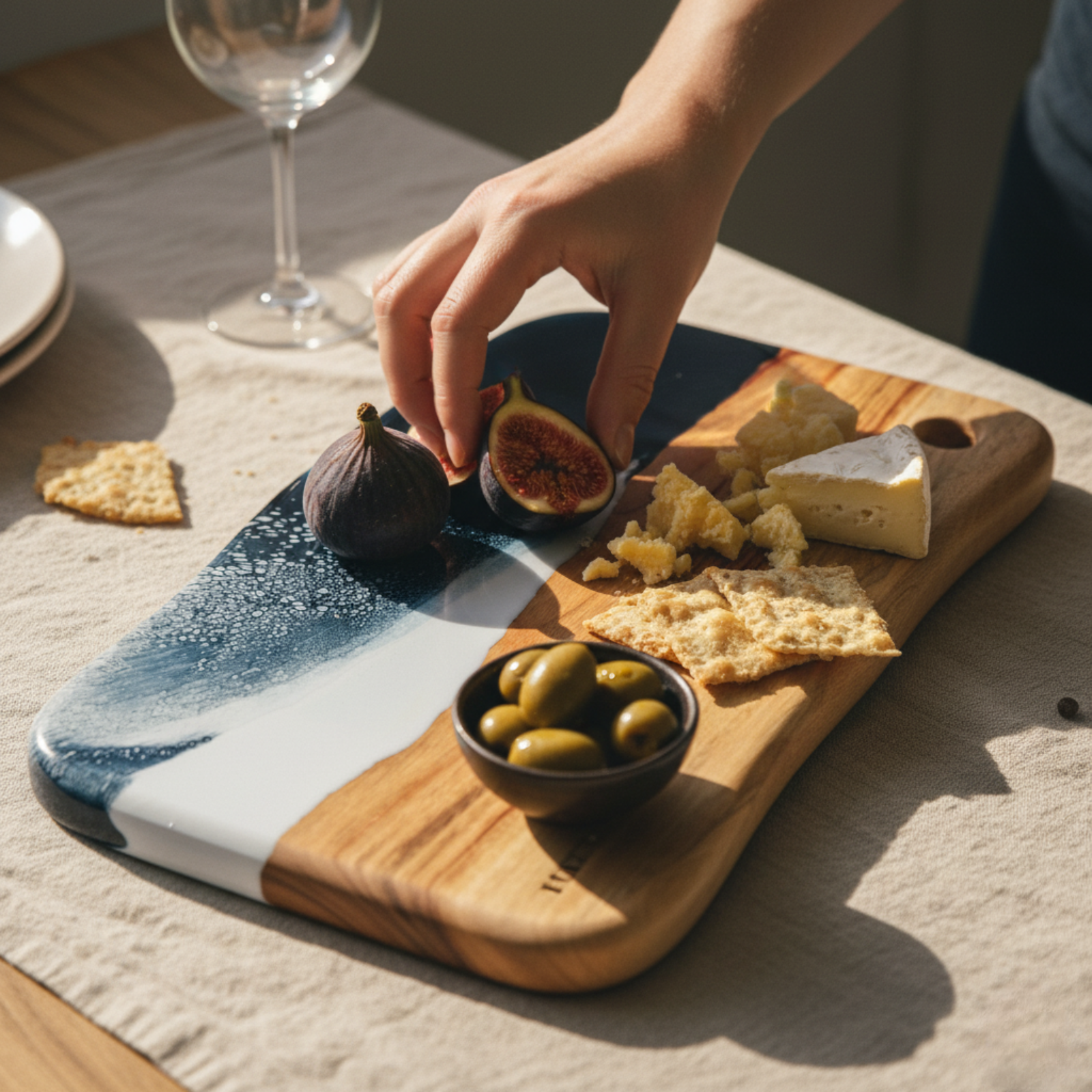The jacarandas are blooming. The balcony doors are open again. You're noticing the light stays longer, and suddenly—without quite planning it—you're thinking about having people over.
But there's a hesitation. A kind of social rust that sets in after months of takeaway on the couch and early nights. The last time you hosted felt... complicated. There were too many things to clean, too many decisions about what to serve, too much pressure to make it look a certain way.
So you didn't. And the months stretched on.
If this sounds familiar, you're not alone. October in Australia is the month we collectively emerge from our cocoons—longer days, warmer evenings, the unspoken invitation of outdoor spaces we'd forgotten we had. But re-entering the rhythm of gathering, of hosting, of opening your home again? That takes something more than just better weather.
It takes permission. Permission to start small. Permission to make it simple. Permission to remember that a dinner party isn't a performance—it's just an excuse to be together.
The Emotional Barrier No One Talks About
Somewhere between the last lockdown and the relentless pace of modern life, hosting became a thing. Not the joyful, spontaneous thing it once was, but a high-stakes event that required Pinterest-level styling, a three-course menu, and the kind of effortless charm that influencers make look easy at 6pm on a Wednesday.
We stopped inviting people over because the bar felt too high.
But here's the truth: your friends don't want a performance. They want you. They want a reason to leave the house, put on something other than activewear, and sit somewhere that isn't their own dining table for the seventeenth night in a row. They want conversation that isn't via text. They want to feel like part of something, even if that something is just cheese and wine on your back deck.
The barrier to hosting isn't your lack of skill or your imperfect home. It's the story you've told yourself about what hosting needs to be.
So let's rewrite it.

Start With What You Already Have
The fastest way to talk yourself out of hosting is to make a list of everything you think you need. New plates. Better glassware. A cheese board that looks like it belongs in a magazine. Cloth napkins. Fairy lights.
Stop.
Look around your home right now. You have a table. You have chairs (or a couch, or a blanket on the floor). You have something to drink and something to eat. That's it. That's the entire infrastructure required.
If you want to elevate it—and you should, because small rituals matter—choose one thing that makes it feel intentional. A handcrafted resin board with fruit and cheese arranged simply. A set of resin coasters that show you thought about where people would put their drinks. A single candle.
One object that says: I made space for you.
That's all it takes.
The Three-Person Rule
If you're nervous about hosting again, don't invite eight people. Invite three.
Three is the magic number. It's small enough to feel intimate, not performative. It's forgiving if the conversation lags (it won't). It's manageable if you're rusty in the kitchen. And it creates the kind of evening where everyone talks to everyone, rather than splintering into separate conversations at opposite ends of the table.
Three people. A simple meal. Two hours. That's your re-entry.
Once you've done it once, you'll remember how good it feels. And the next time, it won't feel like such a leap.
The No-Stress Menu Formula
You don't need to cook a three-course meal. In fact, you shouldn't.
Here's the formula that works every time:
Something to share immediately. Olives, crackers, cheese, fruit. Arranged on a timber and resin cheese board or just a wooden board you already own. This buys you time, sets the tone, and makes people feel welcome the second they walk in.
One main dish that doesn't require timing. A slow-cooked lamb shoulder. A big salad with roasted vegetables and burrata. A pasta bake. Something you can prep earlier, something forgiving, something that tastes better when it's been sitting for ten minutes while everyone finishes their wine.
Dessert from somewhere else. Buy it. No one cares. Serve it on nice plates if you want to feel fancy, but don't make this your stress point.
The goal isn't to impress. The goal is to create space for connection without spending the entire evening in the kitchen.
Let People Help (Seriously)
When someone asks, "Can I bring anything?" say yes.
Not because you need it, but because it makes them feel like they're contributing. It lowers the stakes. It shifts hosting from a one-person show to a collective act.
"Bring wine" works. "Bring a salad" works. "Bring yourself and maybe some cheese" also works.
The moment you let people in—not just into your home, but into the process—the whole thing becomes lighter.
The Table Doesn't Need to Be Perfect
You don't need a styled tablescape. You don't need matching napkins or a runner or flowers arranged in that effortlessly undone way that takes forty-five minutes to achieve.
What you need is a table that feels cared for.
That might mean a linen cloth (or just a clean surface). A few candles. Some greenery from the garden. A resin bowl with lemons in it because they're in season and they're beautiful.
It might mean nothing at all except that you've cleared the mail and the clutter, and the table is ready for people to sit at.
The table isn't the point. The people around it are.
Why This Matters More Than You Think
There's something quietly radical about hosting in 2025.
In a world where we're more connected than ever and lonelier than we've been in decades, the act of inviting someone into your home—of sharing food, time, presence—is a form of resistance. It's a refusal to let convenience replace connection. It's a way of saying: you matter enough for me to make space.
And it's not just for them. It's for you.
Because when you host, even imperfectly, you remember what it feels like to be part of something. To create a moment that didn't exist before. To watch people relax into your space, laugh too loudly, stay longer than they meant to.
You remember that your home isn't just a place to sleep and work. It's a place to gather. And that matters.
Start This Weekend
You don't need to wait for the "right time" or the "right occasion." October is already here. The balcony is ready. The evenings are perfect.
Text three people. Tell them to come over Saturday. Tell them it's low-key. Tell them to bring wine.
Put cheese on a board. Light a candle. Pour a drink.
And remember why you loved this in the first place.

What if my house isn't "ready" for guests?
Your house is ready. Clear the table, tidy the bathroom, and light a candle. That's it. People aren't coming to inspect your home—they're coming to see you. The bar is much lower than you think, and most people are just grateful to be invited somewhere that isn't a bar or restaurant.
How do I make hosting feel effortless when I'm out of practice?
Effortless hosting isn't about perfection—it's about preparation. Choose a menu you can mostly prep in advance, set the table earlier in the day, and have drinks chilled and ready. The more you do before guests arrive, the more present you can be when they're there. And if something goes wrong? Laugh about it. No one will remember the burnt bread, but they'll remember the warmth.
What if I don't have "nice" serving pieces?
You don't need fine china or crystal glassware. Mismatched plates and jars for drinking glasses have their own charm. But if you want one or two pieces that make you feel like you're hosting with intention, invest in something tactile and handmade—a resin cheese board, a set of coasters, or a simple bowl that can hold anything from olives to fruit. These are pieces you'll use for years, and they elevate even the simplest gatherings.



Aktie:
Spring Entertaining Rituals: Creating Memorable Moments with Intentional Tablescapes
The Renaissance Dinner Party: How to Create Intimate Spring Connections in Our Digital Age